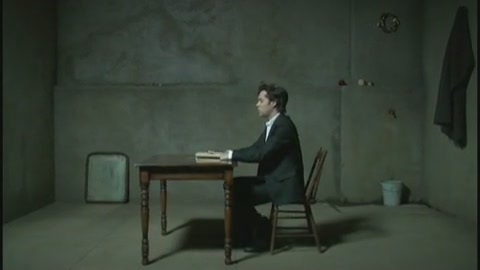This summer, I’m going to make playlists and write about them. This is the second entry in a series called “Chaos.” If you’d like to read from the beginning of the playlist, start here. Hope you enjoy.
“Going to A Town,” Rufus Wainwright

At seventeen, I convinced my parents to let me take my 1995 Chevy Blazer to City Market in Kansas City, where Rufus Wainwright was opening for Ben Folds. It was mid-August the night of the concert, and when Rufus took his seat at the grand piano, I was sweating through my favorite yellow shirt. You know that feeling you get when a musician sings to a crowd but it feels as if they’re only singing to you? A friend in my program once called it “babyness.” At home, I could only listen to Poses whenever the rest of my family was out (we didn’t have speakers that could accommodate headphones, so whatever music any individual chose, the rest of us were subject), and no one seemed to like Rufus’s operatic piano rock as much as I did. My brother called him “the moaner.” I didn’t care. At City Market, I closed my eyes and swayed on the asphalt as the artist played and sang so hard he had to stand at the keys.
Later in my senior year, when I learned Rufus Wainwright was gay, I was hurt in that girlish way, before you learn the difference between wanting to marry someone and loving the way their work makes you feel. Even if I was the kind of person Rufus Wainwright wanted to marry in 2005—in his case, a full-grown man—the United States would not have allowed him. When the chorus of “Going to A Town” asks, “Tell me, do you really think you go to hell for being loved?”, he was asking people like me. I lived in Topeka, site of the Westboro Baptist Church, a conservative Christian community responsible for one of the grossest continual expressions of public homophobia in American history. But as I soaked in Rufus Wainwright’s voice, I wasn’t thinking of the neon signs, or the fact that later that weekend, I would be walking past them on the way to the church my parents and I attended, the pastor of which denounced the Phelps’ methods but not their views. Every morning I was driving to school blasting “Greek Song,” all the while laughing off the brazenness of this ragtag group in their funny clothes invoking Sodom and hellfire next to the Sonic Drive-In, looking at their daily dehumanization of not only my favorite singer but my friends, and rolling my eyes.
This kind of cognitive dissonance is normal for citizens of a country that touts freedom as its core value, all the while preventing its citizens from fully participating in that freedom. I don’t rest the responsibility of decades’ worth of human rights violations on my seventeen-year-old shoulders, but while the song is making clear Rufus Wainwright’s resentment for the United States’ policies—“They never really seem to want to tell the truth / I’m so tired of you, America”—I think he is also dragging the banal, everydayness of our two-faced culture.
The everydayness of violence and beauty juxtaposed. The idyllic, small town-ness of it all. The scenic drives to a school that prioritizes students based on their performance on standardized tests rigged against non-white kids. The walks to church under leafy trees through neighborhoods that reflect decades of segregation, redlining, and housing inequality. A beloved Christian pastor finger-pointing gay people for ruining marriage in a congregation that has a higher divorce rate than other non-Christian faiths. After-church brunch, bacon and eggs and biscuits at a restaurant that is allowed to pay a single mother a $2.13 an hour server’s wage in some states. “I’m going to read it all in the Sunday Times” refers to London Sunday Times editor Andrew Neill denying the existence of AIDS, but you can easily picture headlines featuring Reagan spouting the same harmful BS; the American patriarch in his sunny kitchen, reading and nodding along, morning after morning, while thousands of people die. This kind of self-soothing leaks beyond our borders, too—“You took advantage of a world who loved you well,” Rufus sings: cardigan on your shoulders constructed by child labor. Gas in the tank bought from the company that makes us fight their wars, pollutes our oceans. White picket fence painted by the friendly handymen, immigrants who the president calls rapists and criminals. This is our town. These are the internal contradictions Americans wake up and swallow every day with their morning coffee—in some cases, we have to. I can’t afford most things made by ethical factories in my own country. In order to see my loved ones, I fill my car up with oil that comes from exploitative and environmentally disastrous companies. I will soon join the teachers and administrators working to correct the inequality of public schools, but we can only do so much limited by low salaries, over-crowding, and an administration who wants to privatize and eliminate what level-playing field still exists. Imagine living in a society that punishes ethical choices, if not blatantly by the justice system, then by isolation, by lack of resources, by lack of meaningful and well-paying jobs. The United States is a sick animal that smiles through its pain instead of going to the doctor, because the doctor costs too much.
Sometimes when I’m thinking about all this information—the harmful truths under every street, every choice, every product I own—I feel as sick as my country. I don’t want to get out of bed. Sometimes I wish I could go back to being seventeen and ignorant and happy, casting my unrequited cloud of desire over Rufus Wainwright as I let the music wash over me on that August night. I see people on the news, gathering with their red hats, holding up signs, shouting obscenities, pointing guns at people who disrupt their little cloud of stories. They are willing their lives to go back to ignorance, back to whiteness being an invisible norm that reaps the benefits of every system, back to no one making a stink. Back to the town that tells itself bedtime stories about its goodness, its democratic ideals, its God-given hierarchies. What they don’t seem to acknowledge is that their town, as Rufus sings, has “already been burnt down.” The fantasy world they are trying to preserve never existed. The harder they grip on to their delusion, the more painful it will be when the world changes. When I say “change,” I don’t just mean the election, the policies, or even the attitudes of Americans. I mean the bittersweet mechanisms of nature, of limited resources, of technology—the things we’ve put into motion that are now out of our control, no matter who we vote for.
We are small in relation to the giant, wild, chaos. Sometimes I can be grateful. I have life, I think, and whatever that is, it’s so much better than the opposite. But most of time, the swoop of my stomach is too much to bear. Pain and poison are everywhere. I get dizzy, figuratively and physically. To fight this dizziness, I’ve quieted my life. I consume fewer stories, so I have time to feel what I need to feel, so I can do something to help. I look harder at what I put in my body and the places I allow my mind to go. Rather than trying to hold the world at large, I look at my own little world, my own little ecosystem of texts and glances and disagreements and love languages. The study of one’s hurt and one’s habits, like vocabulary on flashcards. When you have words for people’s actions, including your own, you start to see the words in the world, too. As a very imperfect person in a very imperfect world, this can be satisfying or horrifying or a combination of both. But knowing what to call things means you’re one step closer to knowing what to do to make them better, whether it’s something big or nothing at all.
Transitioning from the literal criticism of “Going to A Town,” I would like to examine what’s going on in few different little ecosystems among the songs that follow, to try and name the resemblance these individual relationships have to larger systems. I don’t want to paste the word “allegory” to the parallels quite yet, but perhaps we can let it camp with us as we explore. We’ve got to stroll around the meanings of these songs carefully; they might scuttle away back into the subconscious, where they bury and take root all over again.

This is an amazing write up and I will be following from now on.
Wow, thanks Fran! A true compliment from so gifted an evaluator of music as yourself. So cool to see your name in this little corner of the Internet. Hope you’re doing well.
Wow- this is so good. A bit depressing but it sounds like you are working through this world just fine. See you this weekend.
> WordPress.com